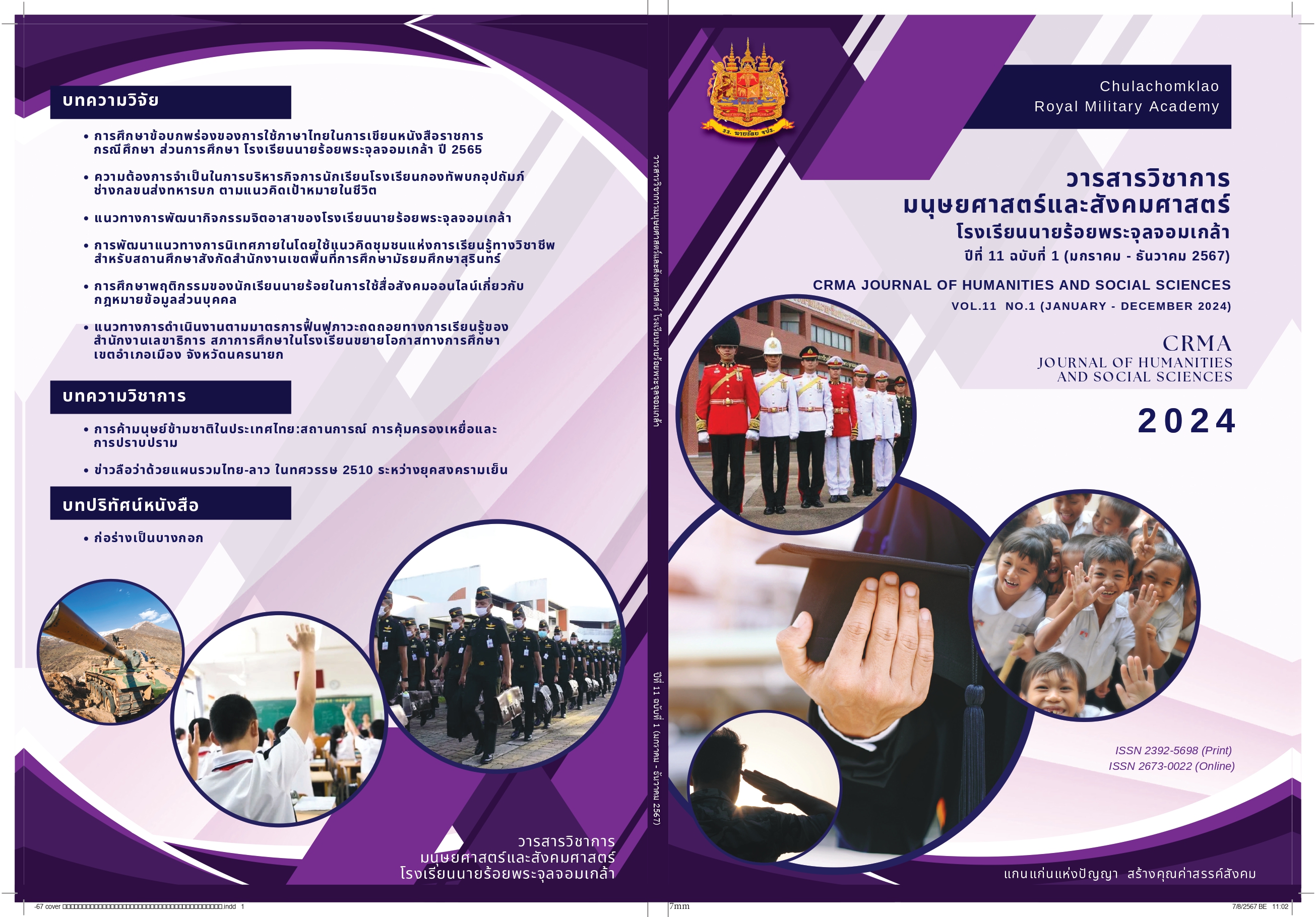Guidelines for Implementing Learning Recession Recovery Measures of the Secretariat of the Education Council in Educational Opportunity Expansion School in Mueang District, Nakhon Nayok Province
Keywords:
Learning Loss, RECOVER, COVID-19Abstract
The objectives of this research were to: 1) Study current operational conditions; and 2) Study operational guidelines for implementing learning recession recovery measures according to the Secretariat of the Education Council in Educational Opportunity Expansion Schools in Mueang District, Nakhon Nayok Province. The sample population was 103 government teachers. Research tools were questionnaires and semi-structured interviews. The statistics used were mean, standard deviation, and content analysis. The results showed that the overall operating conditions were at a high level. When considering each measure, the most effective action was designing a new learning management process that responds to the changing context and needs of the learners, followed by creating a positive attitude toward learning and good physical and mental health of learners. The research recommends three measures that should be developed as priorities, namely: 1) Shoring up morale by addressing teachers’ concerns regarding the performance of their duties in high-risk areas, including by providing welfare and creating good understanding; 2) Developing a digital media library for the open learning approach and linking educational information by providing appropriate budgetary and equipment support, enhancing teachers’ knowledge in digital media production, and allowing all to access this library; and 3) Empowering the development of teachers and educational administrators through appropriate policies and allocating budgets for upgrading learning through technology.
References
กระทรวงศึกษาธิการ. (2562). รายงานการศึกษาแนวปฏิบัติของการสร้างและส่งเสริมการรู้ดิจิทัลสำหรับครู. สำนักงานเลขาธิการสภาการศึกษา กระทรวงศึกษาธิการ.
กระทรวงศึกษาธิการ. (2565). นโยบายและจุดเน้นประจำปีงบประมาณ พ.ศ.2567. สำนักงานเลขาธิการสภาการศึกษา กระทรวงศึกษาธิการ.
กองทุนเพื่อความเสมอภาคทางการศึกษา. (2565, 2 มิถุนายน). คุณภาพชีวิตและสังคม: เมื่อเด็กยุคโควิดเผชิญภาวะ "การเรียนรู้ถดถอย" รัฐต้องแก้อย่างไร?. กรุงเทพธุรกิจ. https://www.bangkokbiznews.com/social/1007890
ธานินทร์ อินทรวิเศษ. (2562). ศึกษาเทคโนโลยีและนวัตกรรมกับการจัดการเรียนการสอนในยุคดิจิทัล. วารสารอิเล็กทรอนิกส์ Veridian มหาวิทยาลัยศิลปากร, 12(6), 491.
แผนพัฒนาเศรษฐกิจและสังคมแห่งชาติ. (2566). แผนพัฒนาเศรษฐกิจและสังคมแห่งชาติ ฉบับที่ 13 (พ.ศ.2566-2570). สำนักงานสภาพัฒนาการเศรษฐกิจและสังคมแห่งชาติ สำนักนายกรัฐมนตรี.
พสชนัน นิรมิตไชยนนท์ และ กมลพร สอนศรี. (2560). รูปแบบที่เหมาะสมในการจัดสวัสดิการและสวัสดิภาพของครูและบุคลากรทางการศึกษาในประเทศไทย. วารสารอิเล็กทรอนิกส์ Veridian มหาวิทยาลัยศิลปากร, 10(1), 1694.
สำนักงานเลขาธิการสภาการศึกษา กระทรวงศึกษาธิการ. (2565). มาตรการฟื้นฟูภาวะถดถอยทางการเรียนรู้. เอส.บี.เค. การพิมพ์.
สำนักงานสถิติแห่งชาติ. (2561). รายงานตัวชี้วัด ITU (International Telecommunication Union) 2561 (ไตรมาส 4). สำนักงานสถิติแห่งชาติ.
Asian Development Bank. (2021). Learning and earning losses from COVID-19 school closures in developing Asia. Special Topic of the Asians Development Outlook 2021. Asian Development Bank.
Azim Premji Foundation. (2021). Loss of learning during the pandemic. Azim Premji University. https://azimpremjiuniversity.edu.in/publications/2021/report/learning-loss-during-pandemic
Blasko, Z., Costa, P., & Schnepf, V., S. (2021). Learning loss and educational inequalities in Europe: mapping the potential consequences of the COVID-19 Crisis. In Bonn (Eds.), Discussion paper series (pp. 13-18). Deutsch Post Foundation.
Cho, Y., Kataoka, S., & Piza, S. (2021, May 1). Philippine Basic Education System: Strengthening Effective Learning During the COVID-19 Pandemic and Beyond - Philippines COVID-19 Monitoring Survey Policy Notes. https://ph02.tcithaijo.org/index.php/jtir/article/view/244018.
Di Pietro, G., Biagi, F., Costa P., Karpinski Z., & Mazza, J. (2020, June 24). The likely impact of COVID-19 on education: Reflections based on the existing literature and Recent international datasets. JRC Technical Report. https://publications.jrc.ec.europa.eu/repository/handle/JRC121071
Econ Digest. (2564, 14 มิถุนายน). เรียนออนไลน์ ผู้ปกครอง พร้อมไหม. ศูนย์วิจัยกสิกรไทย. https://www.kasikornresearch.com/th/analysis/k-social-media/Pages/Ed-Online-FB-14-06-21.aspx
Fitzpatrick, R., Korin, A., & Riggall, A. (2020, October). An International review of plans and actions for school reopening. Education Development Trust. https://files.eric.ed.gov/fulltext/ED610839.pdf
Kaffenberger, M. (2021). Modeling the long–run learning impact of the COVID-19 learning shock: actions to (more than) mitigate loss. International journal of education development, 81, 102326. https://doi.org/10.1016/j.ijedudev.2020.102326
Locke, N. V., Patarapichayatham, C. & Lewis, S. (2021). Learning loss in reading and math in U.S. school due to the COVID-19 pandemic. Istation.
Raymond, M. E. (2021). Learning Losses-What to Do About Them. Stanford University.
U.S. Department of Education, Office for Civil Rights. (2021). Education in a pandemic: the disparate impacts of COVID-19 on America’s students. U.S. Department of Education.
Zierer, K. (2021). Effects of pandemic-related school closures on pupils’ performance and learning in selected countries: a rapid review. Education Sciences, 11(6), 252. https://doi.org/10.3390/educsci11060252
Downloads
Published
How to Cite
Issue
Section
Categories
License
Copyright (c) 2024 CRMA Journal of Humanities and Social Sciences

This work is licensed under a Creative Commons Attribution-NonCommercial-NoDerivatives 4.0 International License.
The content and information in this journal shall be considered as the individual opinions of the authors. In all cases, the editorial board may not necessarily agree with these opinions or be responsible for them.
The articles and information that are published in the journal are considered to be the copyright of the journal. Any party who wishes to re-publish the journal’s articles must seek permission from the journal’s editor. Articles that receive the agreement for publications must not appear in any other publications prior to their appearance in this journal. The editorial board will send one copy of the journal to each author whose submission was accepted and published.







